OXFORD, Mich. — It was 4 p.m. on a Monday afternoon, time for Izak Lopez, 6, to remove one sock — just one — and get ready for the training program his parents say has drastically improved his life and theirs.
Izak’s coach at his training center in this suburb of Detroit used a paper clip to attach a piece of felt dabbed with peppermint oil to the right side Izak’s shirt collar. She put a small clicking metronome on the left side of his collar and added “shakers” — vibrating bands — to his left arm and shin. She then gave him a pair of glasses with purple lenses and a blinking light so that Izak’s senses would get constant stimulation as he made his way through the exercises that are central to a program his parents credit with reducing the violent tantrums that used to torment him and his family.
A week later, 1,300 miles away in a center run by a different company with a view of the mountains in Colorado Springs, Kyle Gregory, 9, was also training to the nerve-wracking pulse of a metronome. He was trying to remember where on a chart his trainer had placed a pair of cards before she could count to 10.
Both children have been diagnosed with autism and attention deficit hyperactivity disorder, or ADHD.
Both have struggled at home and at school. Both have tried interventions recommended by doctors that their parents didn’t think benefited them enough.
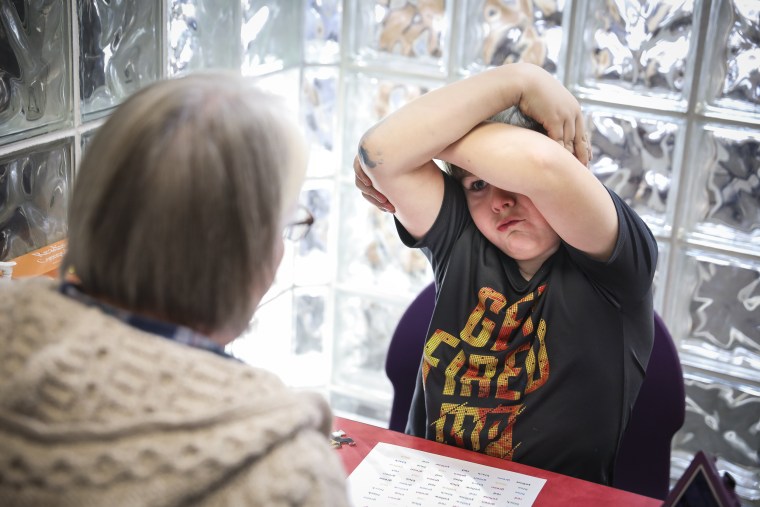
So both of their families have reorganized their lives and spent thousands of dollars to enroll in intensive after-school “brain training” programs that offer the promise of permanent changes to the human mind.
The programs are part of a fast-growing industry that’s based on the premise that targeted games and exercises can rewire the brain to boost memory, sharpen thinking or decrease the challenges associated with anxiety, autism, ADHD and other disorders. Brick-and-mortar training centers like Brain Balance Achievement Centers, which Izak attends, and LearningRx, Kyle’s program, are just one piece of a $2 billion global brain technology market that is increasingly going around the medical industry and marketing directly to consumers.
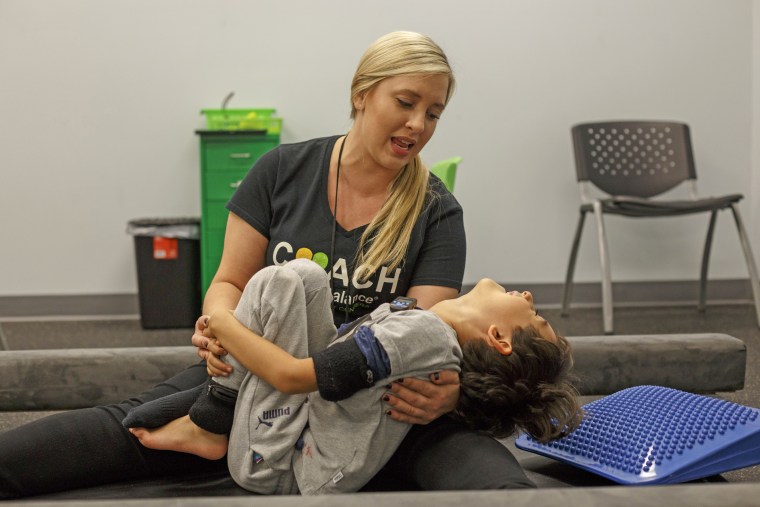
But the premise behind the programs has faced significant criticism from doctors and scientists who warn that some are making dubious claims. These personalized programs can cost $12,000 or more for six months of training, three days a week. Families have gone into debt or turned to crowdfunding sites to pay for them.
“They’re selling hope,” said Eric Rossen, the director of professional development and standards for the National Association of School Psychologists. “These organizations are not necessarily predatory, but they are definitely there and almost chasing the parents who are desperate, who are overwhelmed and who feel that they have no recourse.”
As the number of children diagnosed with ADHD and autism surges in the U.S., according to federal data, and as parents become exasperated with treatments that don’t work or involve medications that carry the risk of side effects, neurotechnology industry analysts predict the demand for programs like these will only grow.
NBC News spoke with more than a dozen scientists and experts who said that while there’s promise in some forms of brain training, the field is so new that many companies are making claims that go far beyond what they can prove.
That hasn’t stopped families from enrolling. NBCNews spoke to 22 parents of children who enrolled in Brain Balance or LearningRx, two of the largest one-on-one training programs, and many described positive results.
“LearningRx makes you use your brain in a different way than you do in school,” said Kyle’s mother, Alana Gregory, who says her son is focusing better and is less likely to hit other children than he was before he started the program in August. “It’s giving him skills to help when he is frustrated. And when he's not as frustrated, we don't have behavior issues.”
But other parents say they’ve seen only minor improvements — if any — despite months of hard work and high bills.
“The whole thing is a hoax,” said Atheer Sabti, who took out a $12,500 loan in 2017 to pay for a six-month Brain Balance program in Plano, Texas, to help his then 12-year-old son, who was getting into trouble and struggling to focus in school.
“They took my money,” Sabti said, “and my son was the same.”
‘We want science to drive treatment’
Much of the growth in brain training is in apps and games that people use at home or in school, said Alvaro Fernandez, CEO of SharpBrains, a research firm that tracks the neurotechnology industry. The global market for direct-to-consumer technology grew from $475 million in 2012 to $1.9 billion last year, Fernandez said.
Those numbers don’t include franchises like Brain Balance or LearningRx, which Fernandez says are more difficult to track financially. But these centers are now in most major U.S. cities. Brain Balance has 108 locations and said it brought in $51.3 million last year. LearningRx has 70 centers in the U.S. as well as 85 centers called BrainRx around the globe. The company declined to provide revenue numbers but says it hopes to add eight U.S. centers and 20 international centers next year.
Other companies include Neurocore Brain Performance Centers, which made headlines in 2017 when U.S. Education Secretary Betsy DeVos disclosed that she and her husband are major shareholders.
Groups that advocate for people with autism and ADHD, including Autism Speaks and Children and Adults with Attention-Deficit/Hyperactivity Disorder, or CHADD, warn parents to be wary of companies like these that claim to address a long list of disorders without much scientific proof.
“We want science to drive treatment and intervention, not just anecdotes,” said Max Wiznitzer, a pediatric neurologist in Cleveland and the co-chair of CHADD’s professional advisory board.
Brain training companies are careful to comply with federal advertising laws, avoiding phrases like “treat” or “cure.” But some companies have run into trouble. LearningRx paid $200,000 in 2016 to settle charges by the Federal Trade Commission about deceptive claims.
LearningRx maintained that the FTC had unfairly applied medical standards to an educational company, but decided that fighting in court would have been too expensive.
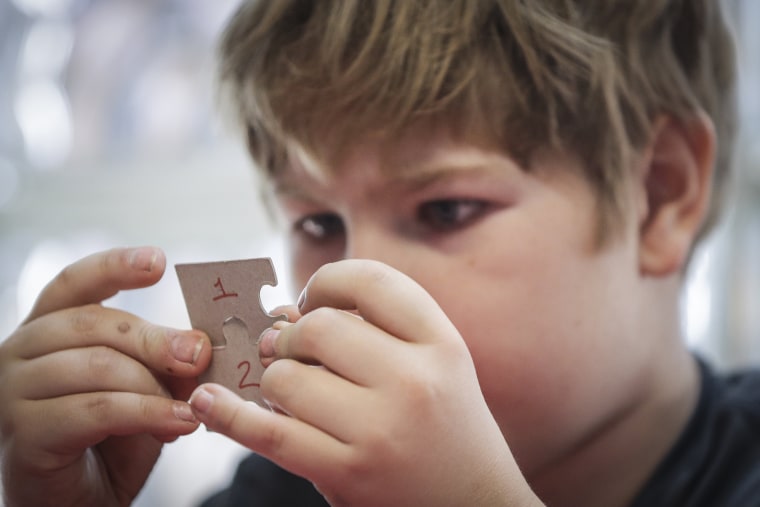
Neurocore, a program that blends diet, exercise, clinical talk therapy and an intervention called neurofeedback that involves attaching electrodes to people’s heads, last year agreed to alter its marketing when an advertising review board objected to ads promoting cures for a host of disorders. But just last month, Neurocore was the subject of a complaintfiled with the FTC by the ad watchdog Truth in Advertising.
“They’ve continued to market in a really inappropriate way,” said Bonnie Patten, Truth in Advertising’s executive director. “They’re marketing unapproved medical devices as being able to treat ailments such as ADHD, anxiety, depression, migraines and memory loss when there's no reliable scientific evidence.”
Neurocore CEO Mark Murrison points to research showing that neurofeedback works, though scientists say it has not been fully proven. He says Patten’s organization has never reached out to him and he doesn’t believe she understands his program.
His company has encountered skeptics, but “that’s to be expected when you offer an alternative to the status quo,” he said.
The FTC declined to comment.
Bare feet and primitive reflexes
Brain Balance centers are colorful, cheerfully decorated places, often located in shopping centers in affluent neighborhoods. They each have a cognitive room where students play video games that target memory or brain function and a sensory motor room filled with mats, balance beams and monkey bars.
On a recent afternoon at the Brain Balance in Oxford, about 40 miles north of Detroit, classical music played softly as coaches guided students through exercises designed to stimulate the left or the right side of their brains.
The Brain Balance program is demanding, calling on families to reduce children’s screen time and to cut most sugar, gluten and dairy from their diets. But what has raised eyebrows among mainstream scientists are some unproven theories that drive the one-on-one training.
One of those theories is the popular notion that the right and left side of the brain have different influences on personality. Brain Balance claims that a right brain weakness can cause impulsivity and anxiety, while a left brain weakness can lead to poor math or reading skills. That’s why kids remove just one sock: Brain Balance believes that as a bare foot makes contact with the floor, the opposite side of the brain will get more stimulation. Metronomes and shakers are placed on the same side as the bare foot.
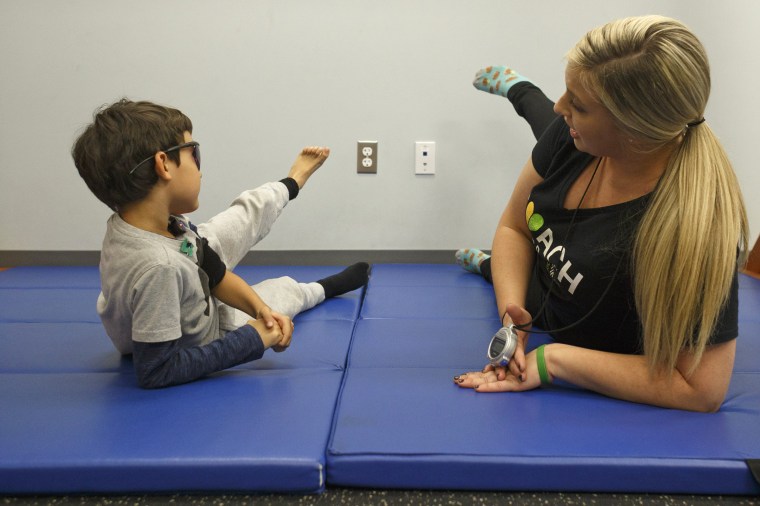
Another Brain Balance theory has to do with primitive infant reflexes, which are the instincts babies are born with to help them survive. The rooting reflex, for example, supports nursing by leading babies to turn toward objects that touch their cheeks. The moro reflex, which likely evolved to help infants cling to their mothers, causes babies to extend their arms and legs when startled.
Doctors say that most people outgrow these reflexes by the time they start preschool. Robert Melillo, a chiropractor and author who founded Brain Balance in 2006, asserted that children who retain reflexes face academic and behavioral struggles. Brain Balance tests children for eight primitive reflexes and has exercises that target each one. The one that targets the moro reflex has children stretch their arms and legs, then curl into a ball.
Other exercises, such as standing on one foot, target balance and coordination to promote “connectivity” in the brain, said Rebecca Jackson, Brain Balance’s vice president of programs and outreach. “I always like to tell the kids that it’s kind of like a workout for your brain,” she said. “We all have strong muscles and weak muscles, and it’s the same thing with the brain.”
George Anderson, a senior research scientist in the Child Study Center at Yale University, is doubtful of this approach. He is among several university-affiliated experts and medical professionals who reviewed the research on the company’s website and saw little proof to support the program’s theories.
There is evidence that people with neurological issues like ADHD and autism are, in fact, more likely to retain primitive reflexes than their peers, Anderson said. But that doesn’t mean that the Brain Balance exercises can eliminate retained reflexes, or that eliminating those reflexes would permanently reduce challenging behaviors.
“There's just a lack of foundation for what they’re doing,” he said. “There are things that they really need to show, and I’m surprised they’re in business and have 100 centers if they haven’t shown that. Actually, I'm not surprised they’re in business if they can get $12,000 for doing this. It’s a way to make money. I’m surprised they don’t view this as unethical.”
Daniel Simons, a University of Illinois psychology professor who has scrutinized 130 papers cited by brain training programs, said there is “zero evidence” to support the Brain Balance theory about problems being caused by a weakness on one side of the brain. “This is pseudoscience at best,” he said.
Brain Balance CEO Dominick Fedele says science supports the program’s components, including the benefits of exercise for the brain. But he acknowledged that the company had not, until recently, attempted a comprehensive study comparing lasting outcomes for children who came through the program to a control group that did not. The company is now helping to fund such a study by a Harvard researcher.
“We know there are skeptics out there and we suspect there will continue to be, but we want to be able to show that this is a program that truly makes a difference,” Fedele said.
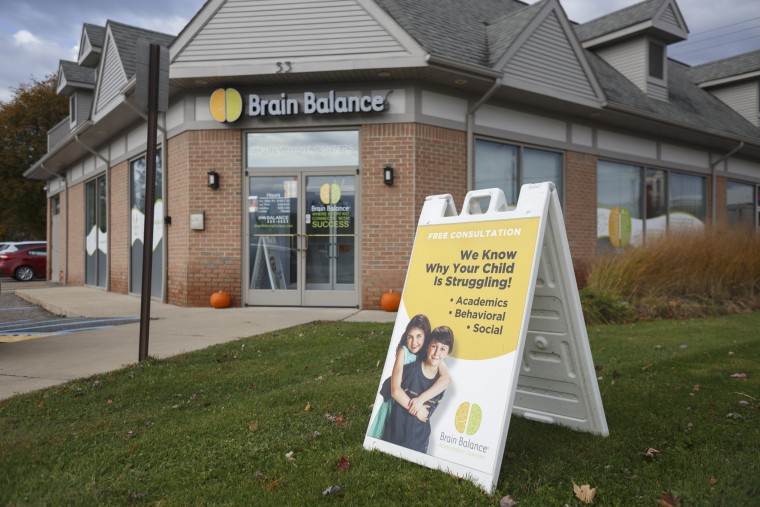
The company rejected the notion that selling an intervention that hasn’t been fully proven is unethical. Many families report positive results and the activities aren’t harmful, said Jackson, the Brain Balance vice president.
Asked about downsides, Jackson replied, “the downside is there is cost … or time and money involved.”
Melillo, who sold most of his stake in the company to a private equity firm several years ago, told NBC News that he honed the program over 10 years of working with children before he started charging for it.
“The idea that we always have to wait to make sure we have absolute proof makes no sense,” he said. “The only way you know it works is by using it.”
‘They are interested in making money’
Parents who say the program doesn’t work resent the thousands of dollars they spent to test it out.
Srikanth Mamidi was so angry about not seeing lasting benefits for his autistic son after six months in a Brain Balance program in Cary, North Carolina, that he tracked Melillo down at a ribbon cutting for another center and confronted him.
“It was a time waster, an energy waster and a money waster,” Mamidi said.
The program had seemed “wacky” to him, but he and his wife were determined to avoid giving medication to their son, who was 11 at the time and was struggling to make friends and pay attention in class, he said. They were hopeful when they paid $10,000 for the program and committed to driving 40 minutes each way for the training sessions.

But Mamidi said the small changes they saw in the beginning, such as a slight improvement in their son’s ability to communicate, faded quickly.
When Mamidi confronted Melillo in 2016, the company founder just walked away, Mamidi said. “They are interested in making money rather than improving people’s lives,” he said.
Melillo said he did not recall the confrontation but notes that Mamidi is just one disgruntled parent among thousands who swear by the results.
Most Brain Balance reviews posted on Google and Yelp are glowing. Many franchise owners, including the couple who own the Oxford center, are former clients who tell moving stories about the relief they felt when they walked through the door after an overwhelming quest to help their children.
Izak’s mom, Patty Lopez, says her son is a different child than he was when he started Brain Balance last spring. Back then, he was prone to daily tantrums that would last for an hour or more. When he was briefly in kindergarten last year, he trashed the classroom so many times that a teacher described him as the “worst student that she had ever had in 18 years,” Lopez said.
The family has made sacrifices to adopt the program’s strict dietary and screen-time guidelines and make the hourlong drive to trainings. But it’s all been worth it, she said.
After seven months of Brain Balance, Lopez said Izak is doing well in school and now rarely has meltdowns, and she and her husband have been able to avoid giving him the medication that doctors wanted to prescribe. “It’s a huge change,” she said. “It’s more relaxed. We can play. We can have conversations with him now.”
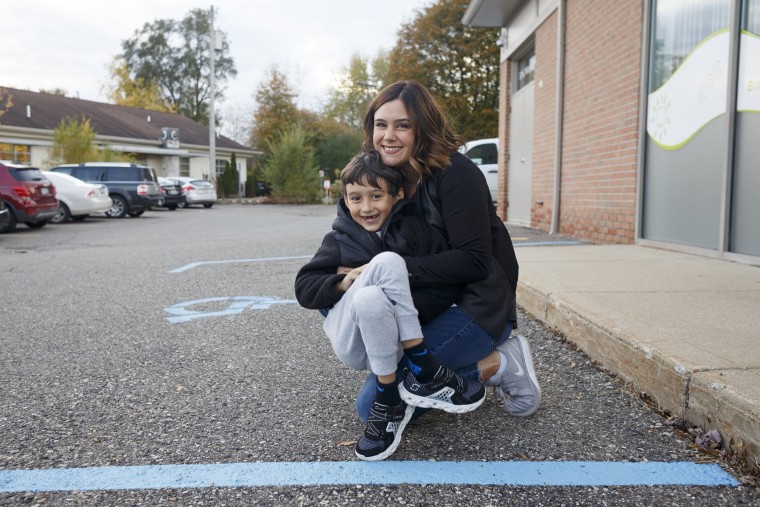
‘If it works, it works’
Why do some families see benefits from brain training programs while others don’t?
Experts say there could be lots of reasons — all interventions, including medicine, affect children differently. Also, parents spending large sums of money can fuel the placebo effect, the belief that a treatment is working even if it’s not.
Children in the Brain Balance program are doing regular exercise and eating better than they may have been before, which can lead to better sleep. Many spend less time watching TV or staring at a phone. They’re getting lots of personal attention from Brain Balance’s coaches. And they’re developing and maturing.
“At the end of the year, they're better and many times they would have gotten better on their own,” said Rossen, of the National Association of School Psychologists.
Many variables affect children’s lives — new teachers, new schools, new milestones. It can be difficult to know what accounts for behavioral changes.
Ben Forbush, 19, a freshman at Michigan State University, said Brain Balance helped him with depression and anxiety when he enrolled as a high school senior.
He started eating breakfast and getting more exercise. He significantly curtailed the time he spent on his phone, and slept much better.
“It might have been that the program enabled me to take care of myself a lot more than I had before,” he said. “I’ll never know which aspect it was. There’s a chance it could have been any of them. If it works, it works. It definitely helped me a lot.”
Crystal Hoshaw, a California mother, believes Brain Balance helped her son Noah, 7, with reducing repetitive behaviors related to autism and anxiety, such as sucking on his hands, that had been exacerbated by his parents’ separation and a move to a new home.
She credits Brain Balance with Noah’s improvements because his tics were related to the nervous system, which the program targets. Noah also may have benefited from the extra time he and his mother spent together during the 45-minute drive to Brain Balance in San Francisco. The two stopped for burgers in what became “little special dates,” she said. To Hoshaw, the exact source of Noah’s progress matters less than the results.
“It doesn't have to be a hard line — a good or a bad or a magic bullet or snake oil. It doesn’t have to be so polarized,” she said. “It can just be one part of a holistic, well-rounded approach to helping a kid.”
‘There is no magic pill’
The LearningRx training center in Colorado Springs buzzed with activity on a recent afternoon as seven students and their trainers worked together at small tables. The noise level is intentionally loud to train clients to tune out distractions.
One child bounced on a mini-trampoline as she tried to recall all 45 U.S. presidents. Another child tossed a ball with his trainer as they took turns reciting the alphabet in time with a metronome, an exercise designed to help him multitask.
Many of LearningRx’s brain games are similar to exercises that psychologists use to conduct IQ tests, including recalling numbers or shapes. They’re given easy tasks to start and are rewarded with high fives from their coaches and points they can save up to buy prizes. When they can recite all of the presidents, their picture is posted on the wall.

LearningRx, which was founded in 2003 by an optometrist, initially as a vision therapy program, says it has always done research to show that the program can, for example, help the 29 percent of clients who have ADHD. The company has made a greater effort to publish that research since the FTC charges.
In the past three years, the company has published 11 peer-reviewed studies, said Amy Moore, an educational psychologist and research director of the LearningRx’s research arm, the Gibson Institute of Cognitive Research. Among them is a small clinical trial published in a neuropsychiatry journal that found statistically significant improvements in a group of seven clients who had ADHD compared to a control group of six people with ADHD who did not attend LearningRx.
“‘Prove’ is not in our language, but we have a convergence of evidence that shows that the program changes test results,” Moore said. “It changes connectivity in the brain and it changes real life.”
But questions persist.
“I would want a lot more evidence,” said Thomas Redick, a psychology professor at Purdue University who has reviewed hundreds of brain training studies. He was among several experts who spoke with NBC News who noted that the peer-reviewed controlled trials and other studies touted on LearningRx’s website were fairly small or lacked methodological rigor, such as measures to control for the placebo effect.
Redick added that he doesn’t doubt that LearningRx clients do better on IQ tests after months of training, but he questioned whether the benefits translate to other settings. He is skeptical of LearningRx’s claims that its clients have improved at school.
“You can learn mnemonic strategies that are effective but that only works for those materials,” he said. “It’s not changing whether or not you have ADHD.”
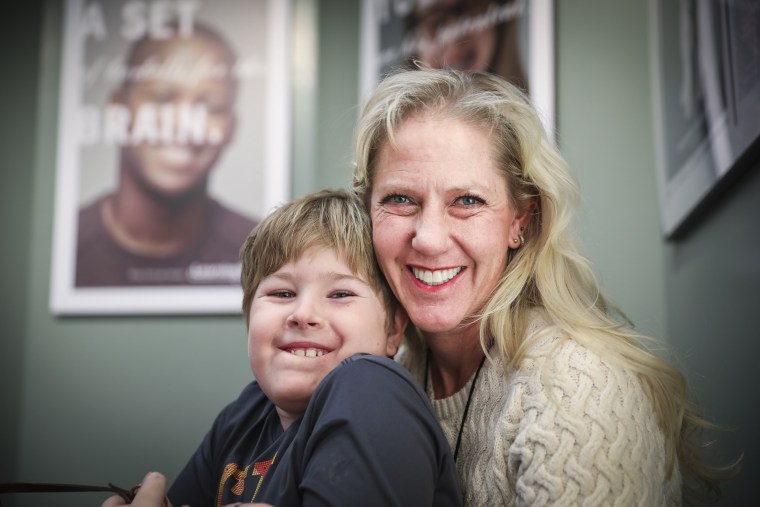
Still, Alana Gregory, Kyle’s mom, said LearningRx has built confidence in her son, which has improved his behavior.
“There is no magic pill,” she said, “but you have to find out what works for your individual child and go with it.”